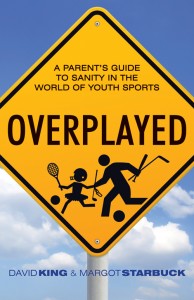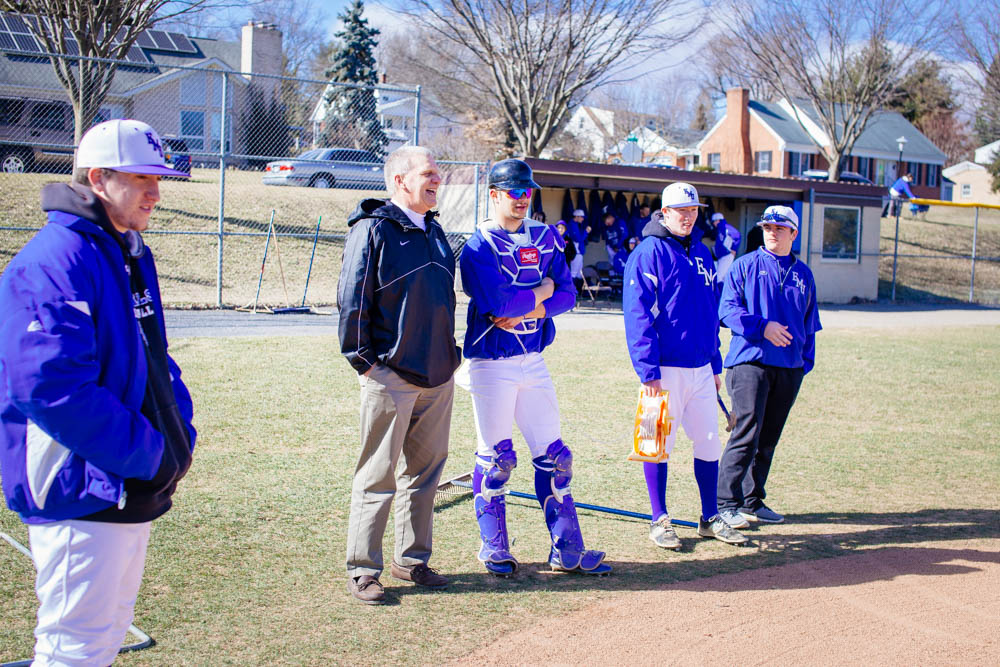Few things permeate American culture like sports; successful collegiate athletes are even dubbed “All-American.”
The American Alliance of Health, Physical Education and Recreation recommends children get a minimum of 30 minutes of large muscle play a day, but children regularly surpass that in the world of youth sports.
From a young age children — often pushed by their parents — are tossing baseballs, kicking soccer balls or dribbling basketballs in the hopes of being the best. Between equipment, training camps, specialized leagues and travel costs, youth sports is an expensive undertaking, taking up to 10.5 percent of a family’s gross income, according to 2015 research by Utah State University’s Families in Sports Lab.
In his new book “Overplayed: A Parent’s Guide to Sanity in the World of Youth Sports,” Eastern Mennonite University athletic director David King, along with coauthor Margot Starbuck from Durham, N.C., asks, “To what end?”

Although King only began considering writing a book a few years ago, his views on youth sports had been developing since he was a high school athletic director 15 years ago. While most literature on the subject is written by parents, coaches, child psychologists and journalists, as EMU athletic director, King was afforded a unique view of the effects of youth sports at the collegiate level, and what he found shocked him.
He derived further validation from John R. Gerdy’s “Sports: The All-American Addiction,” where Gerdy challenges society’s assumptions that youth sports teach lessons in sportsmanship, discipline and teamwork.
Few athletes go on to collegiate sports
Burnout and overuse injuries from specializing in a single sport from a young age are common in collegiate sports, but lesser known effects King sees include a sense of entitlement, unrealistic expectations of ability and a lack of understanding of the importance of practice.
“There’s this mindset that ‘I’m this good because I play for this special team,’ but they forget about how many good athletes there actually are out there,” King said.
According to NCAA statistics, only 3 percent of high school basketball players and 6 percent of football players go on to play in college, despite the fact that specialized youth leagues over inflate athletes’ egos, according to King.
“But none of our coaches at the collegiate level have ever recruited someone because the kid was on the team who won the 11-year-old soccer classic in Winston-Salem, N.C.,” he said.
Adults bring different values to youth sports
King and Starbuck blame the “adultification” of youth sports for many of the problems seen in collegiate athletes.
“We’re taking away free play and organizing everything the way we understand it as adults, which is why there are scoreboards and soccer fields the same size for 8 year olds and 12 year olds,” King said. “We take the fun out of it, and that’s usually the first reason kids give for why they quit.”
If youth sports focused more on what the children wanted, the kids decide how long they want to play instead of parents and coaches weeding children out of a sport in elementary or middle school.
Parents should never push their children into youth sports, King said, because apart from learning to resent the sport, a parent/child relationship based on performance could easily develop.
“We think it’s developing all this commitment to the sport — and it can — but if mom and dad come to the child’s games and then decide not to come when they see the child rarely plays, it sends the message, ‘I’m not good enough,'” King said.
Sports should include everyone, emphasize skills and fun
Despite pointing out their shortcomings, King is still in favor of youth sports as long as they’re structured the right way.

Ideally, the first step would be removing any awards or trophies until the high school level.
“The kids know who won and lost, but why do we have to emphasize it?” he said. “They will forget about it halfway home.”
Instead, King said, leagues should practice twice a week, focusing on skills and gather once a week with other practice groups to play a game, but creating different teams each game.
“As soon as you make teams that are the same, you have adultification,” King said. “The kids will play a pickup game, and they know who won or lost, but the next time you play, the teams will be different, so it won’t matter.”
This prevents kids who could be very good at a sport at age 18 from being left behind because they weren’t an amazing player at age 10.
Many coaches have told King that kids don’t have to begin playing a sport year round until eighth grade to have a chance of successfully playing in college.
“Let’s move that specialization line up to junior high school, and then you keep developing those skills but playing more difficult teams,” he said. “If someone wants to be a collegiate athlete, there has to be a level of specialization by junior or senior year of high school.”
King suggests that parents teach their children to take a macroscopic view of their development, focusing on how their skills are improving for the long term, instead of how well their team is doing in a particular season.
Parents should also encourage their children to concentrate on the intrinsic values of sports.
“The introduction of extrinsic values too early in life will inhibit the development of intrinsic values,” King said. “The child will begin playing for the new uniforms, big crowds and winning trophies instead of their desire to play the game.”
Article reprinted with permission from the Daily News-Record.

I cannot wait to read this book and pass it on to my kids. They have this somewhat unpopular idea that kids sports shouldn’t override family life completely. Being a crazed “soccer mom” seems to be the typical complaint. (bragging?)
I have also noted that some of my kid’s peers, who played 3 sports all through high school, had cortisone injections to get through basketball games, now are already experiencing a lot of joint issues in their 30’s. Not worth it!